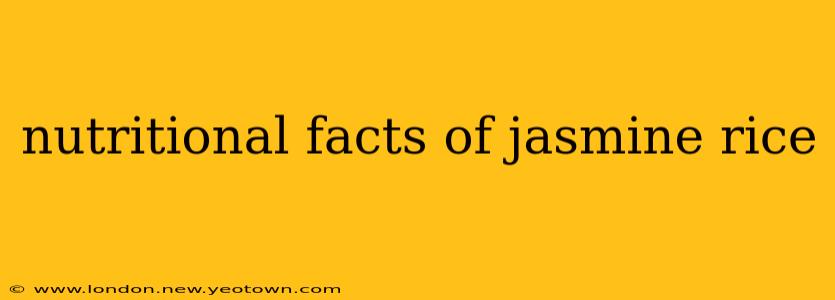Jasmine rice, with its delicate aroma and fluffy texture, is a staple in many cuisines across the globe. But beyond its delightful taste, lies a nutritional profile worth exploring. This isn't just about calories; we'll delve into the vitamins, minerals, and other components that make jasmine rice a part of a balanced diet. Let's unravel the nutritional facts, separating fact from fiction.
What are the basic nutritional facts of Jasmine rice?
A typical serving of cooked jasmine rice (around 1 cup or 195 grams) offers a surprisingly moderate nutritional punch. It’s a good source of carbohydrates, providing energy for your daily activities. It also contains small amounts of essential minerals like magnesium and manganese, contributing to various bodily functions. However, it's relatively low in protein and fiber compared to some other grains. The exact nutritional values can vary slightly depending on factors like the specific rice variety, growing conditions, and cooking methods. But generally, you're looking at roughly 200 calories per serving, with a significant portion coming from carbohydrates.
Is Jasmine rice high in carbohydrates?
Yes, jasmine rice is predominantly composed of carbohydrates. This makes it a quick source of energy, perfect for fueling physical activity. However, this high carbohydrate content should be considered when planning your diet, particularly if you're managing your blood sugar levels. The carbohydrates in jasmine rice are primarily starches, which break down quickly into glucose. While this provides energy, it's crucial to consume it as part of a balanced meal, incorporating fiber-rich foods to help regulate blood sugar levels and prevent a rapid spike.
How much protein is in Jasmine rice?
Compared to other grains like quinoa or brown rice, jasmine rice is relatively low in protein. A typical serving provides only a modest amount, not enough to meet significant protein requirements. Therefore, it's important to combine jasmine rice with other protein sources, such as lean meats, beans, lentils, or tofu, to ensure you get adequate protein in your diet. This combination helps create a more complete and balanced nutritional profile.
Does Jasmine rice contain vitamins and minerals?
While not a powerhouse of vitamins and minerals, jasmine rice does contain small amounts of essential nutrients. It's a source of manganese, which plays a role in bone health and metabolism, and magnesium, crucial for muscle function and nerve health. It also contains trace amounts of other vitamins and minerals, but these are generally not significant contributors to your daily intake. To ensure you meet your daily vitamin and mineral needs, it's best to diversify your diet and include a variety of fruits, vegetables, and other whole grains.
What are the benefits of eating Jasmine rice?
The benefits of eating jasmine rice are linked to its nutritional components and its role as a readily available carbohydrate source. It provides a quick and convenient energy boost, perfect for those seeking easily digestible carbohydrates. However, it's vital to remember that consuming jasmine rice as part of a well-rounded, balanced diet is key to maximizing its benefits and avoiding potential drawbacks associated with solely carbohydrate-heavy meals. Its palatable taste also plays a considerable role in its widespread acceptance as a food source.
Is Jasmine rice good for weight loss?
This is a complex question. Jasmine rice, like other carbohydrates, contains calories, which contribute to your overall energy intake. If consumed in excess, it can hinder weight loss efforts. However, moderate consumption of jasmine rice as part of a calorie-controlled diet could be acceptable. The focus should be on portion control and balancing it with other nutrient-rich foods to aid in overall weight management. Simply put, it's not inherently good or bad for weight loss—it depends on the context of your entire diet.
How does Jasmine rice compare to other types of rice?
Jasmine rice's nutritional profile sits somewhere in the middle compared to other types of rice. Brown rice, for instance, is higher in fiber and nutrients but has a slightly nuttier taste and firmer texture. White rice varieties, including jasmine, generally have a more refined taste and quicker cooking time, but are lower in fiber and certain nutrients. The choice depends on personal preference, dietary needs, and desired texture.
Ultimately, understanding the nutritional facts of jasmine rice is about informed choices. It can be a delicious and satisfying part of a balanced diet, but mindful consumption and balanced meal planning remain crucial. Remember to diversify your food intake to receive the complete range of nutrients your body needs.

